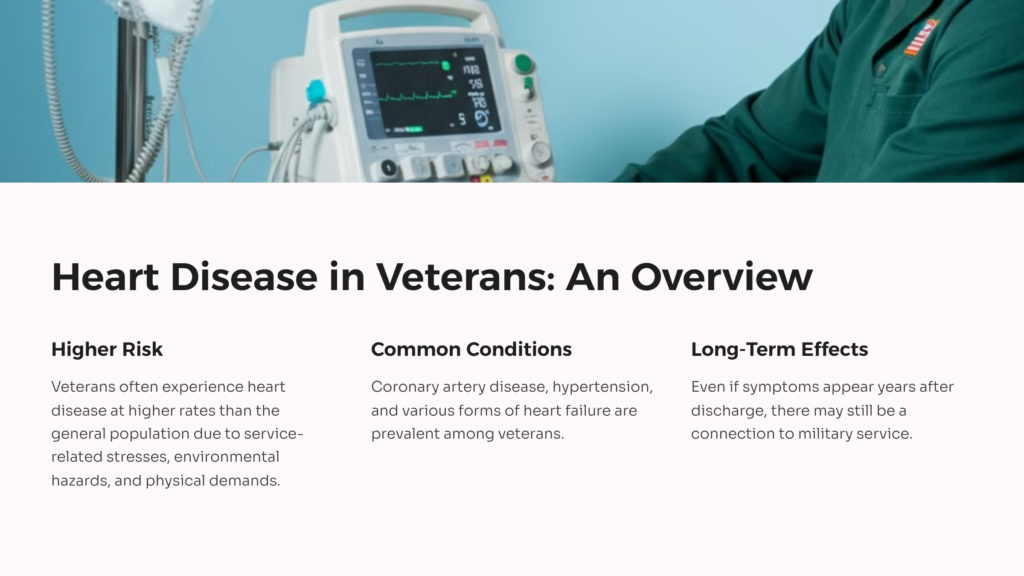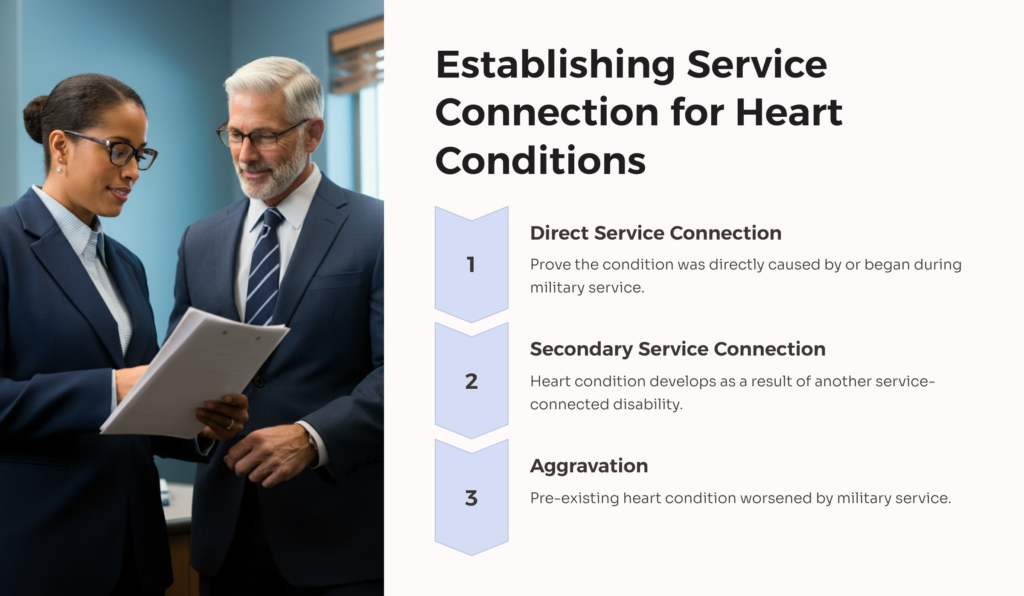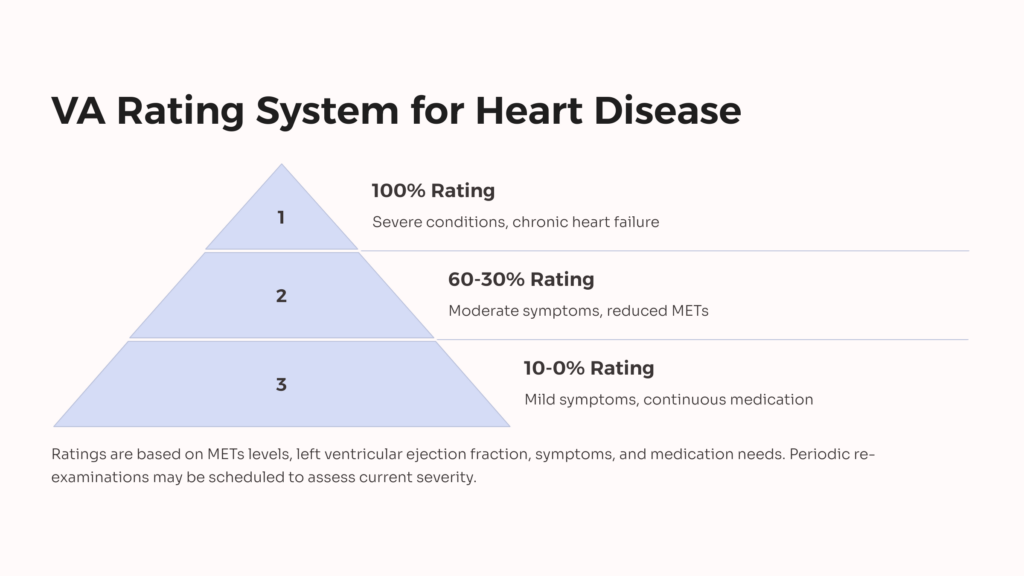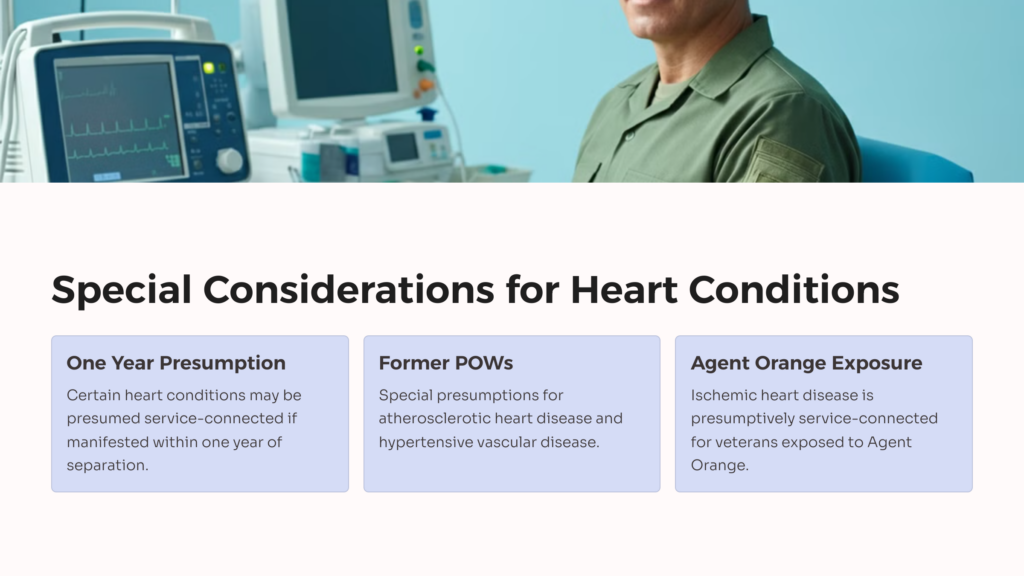When it comes to veterans’ health benefits, understanding VA presumptive conditions is crucial. These are specific illnesses or disabilities that the Department of Veterans Affairs (VA) automatically assumes are related to military service. For heart disease, this means that veterans with certain heart conditions may be eligible for disability benefits without having to prove a direct connection between their service and their condition.
Presumptive conditions make the claims process easier for veterans. Instead of gathering extensive evidence to show how their military service caused or aggravated their heart condition, veterans only need to prove they have a qualifying diagnosis and meet the service requirements. This simplification can be a significant relief for veterans dealing with the challenges of heart disease.
It’s important to note that presumptive conditions can change over time as new research emerges. The VA regularly reviews scientific studies and may add or modify presumptive conditions based on the latest evidence. Veterans should stay informed about these changes to ensure they’re aware of all potential benefits they may be entitled to.
Heart Disease and Veterans: An Overview

Heart disease is a significant concern for veterans, often occurring at higher rates than in the general population. The stresses of military service, exposure to environmental hazards, and the physical demands of the job can all contribute to an increased risk of heart problems. Common heart conditions among veterans include coronary artery disease, hypertension, and various forms of heart failure.
Many veterans may not realize that their heart condition could be related to their military service. Even if symptoms didn’t appear until years after discharge, there might still be a connection. This is where the concept of presumptive conditions becomes particularly valuable, as it acknowledges the long-term effects that military service can have on heart health.
Veterans experiencing symptoms such as chest pain, shortness of breath, irregular heartbeats, or fatigue should seek medical attention and consider discussing their military service history with their healthcare provider. Early detection and treatment of heart conditions can significantly improve outcomes and quality of life.
Common Heart Conditions Eligible for Presumptive Service Connection
Several heart conditions may be eligible for presumptive service connection, depending on the veteran’s specific circumstances. Some of the most common include:
1. Ischemic heart disease (including coronary artery disease)
2. Hypertensive heart disease
3. Valvular heart disease
4. Arrhythmias
5. Cardiomyopathy
These conditions can qualify for presumptive service connection based on factors such as exposure to Agent Orange, service during specific periods or in certain locations, or development of the condition within a year of separation from service.
For example, ischemic heart disease is a presumptive condition for veterans exposed to Agent Orange during their service in Vietnam. This means that if a Vietnam veteran develops ischemic heart disease, the VA will presume it’s related to their service, making the claims process much more straightforward.
It’s important for veterans to be aware of these presumptive conditions and to seek a proper diagnosis if they’re experiencing heart-related symptoms. A confirmed diagnosis from a healthcare provider is essential when filing a VA disability claim.
How to Establish a Service Connection for Heart Conditions

While presumptive conditions can simplify the process, not all heart conditions will automatically qualify. In these cases, veterans need to establish a service connection to receive VA disability benefits. There are three main ways to do this:
1. Direct Service Connection: This requires proving that the heart condition was directly caused by or began during military service. Veterans will need medical evidence linking their current condition to an event, injury, or illness that occurred during their service.
2. Secondary Service Connection: If a heart condition develops as a result of another service-connected disability, it may qualify for secondary service connection. For example, if a veteran’s service-connected diabetes leads to heart disease, the heart condition could be eligible for benefits.
3. Aggravation: If a pre-existing heart condition was made worse by military service, veterans may be able to claim benefits based on aggravation.
To establish these connections, veterans typically need to provide medical records, service records, and often a nexus letter from a healthcare provider explaining how their condition is related to their military service. Working with a VA-accredited attorney or veterans service organization can be helpful in navigating this process.
Understanding the VA Rating System for Heart Disease

The VA uses a rating system to determine the level of disability and corresponding compensation for heart conditions. Ratings for heart disease can range from 0% to 100%, with higher ratings indicating more severe disabilities and higher monthly compensation.
Key factors in determining the rating include:
- METs (metabolic equivalents) level: This measures the energy cost of physical activities and how they affect heart function.
- Left ventricular ejection fraction: This measures how well the heart pumps blood.
- Symptoms such as dyspnea (shortness of breath), fatigue, angina, dizziness, or syncope (fainting).
- Need for continuous medication
For example, a veteran with a workload of greater than 5 METs but not greater than 7 METs, resulting in dyspnea, fatigue, angina, dizziness, or syncope, might receive a 30% rating. On the other hand, chronic congestive heart failure or a workload of 3 METs or less could result in a 100% rating.
It’s crucial for veterans to understand that their rating can change over time. The VA may schedule periodic re-examinations to assess the current severity of the condition. Veterans should always report any worsening of symptoms to ensure their rating accurately reflects their disability.
Heart Conditions Eligible for Presumptive Service Connection Within One Year of Separation
Some heart conditions may be presumed service-connected if they manifest to a compensable degree within one year of separation from military service. This presumption can be particularly helpful for veterans who develop heart problems shortly after leaving the service. Conditions that may qualify include:
- Arteriosclerosis
- Cardiovascular-renal disease, including hypertension
- Endocarditis
- Myocarditis
For these conditions to be presumptive, they must be diagnosed and documented to a degree of at least 10% disabling within that one-year timeframe. This means that even if the condition wasn’t explicitly noted during service, the VA will presume it’s connected if it appears soon after discharge.
Veterans should be proactive about their health during this crucial period. Regular check-ups and prompt medical attention for any heart-related symptoms can help ensure that any developing conditions are caught and documented in time to qualify for this presumption.

Heart Conditions Presumptive for Former POWs
Former prisoners of war (POWs) are granted special consideration for certain heart conditions due to the extreme hardships they endured. For POWs, the following heart conditions may be presumptively service-connected:
- Atherosclerotic heart disease or hypertensive vascular disease (including hypertensive heart disease) and their complications (including myocardial infarction, congestive heart failure, and arrhythmia)
- Stroke and its complications
These presumptions apply regardless of how long after service the condition develops. This recognition of the long-term effects of captivity on heart health ensures that former POWs can receive the care and compensation they need, even if their heart problems don’t manifest until many years after their release.
It’s important for former POWs to be aware of these presumptions and to seek regular heart health check-ups. Even if they’re not currently experiencing symptoms, early detection and treatment can be crucial in managing heart conditions effectively.
Agent Orange and Presumptive Heart Conditions
Agent Orange exposure is a significant concern for many Vietnam-era veterans, and its link to heart disease has been well-established. The VA recognizes ischemic heart disease (including, but not limited to, acute, subacute, and old myocardial infarction; atherosclerotic cardiovascular disease including coronary artery disease and coronary bypass surgery; and stable, unstable and Prinzmetal’s angina) as presumptively service-connected for veterans exposed to Agent Orange.
This presumption applies to veterans who:
- Served in Vietnam between January 9, 1962, and May 7, 1975
- Served in or near the Korean DMZ between September 1, 1967, and August 31, 1971
- Served on certain U.S. Air Force bases in Thailand during the Vietnam Era
- Served on certain Royal Thai Air Force bases during the Vietnam Era
- Regularly and repeatedly operated, maintained, or served onboard C-123 aircraft known to have sprayed Agent Orange
Veterans who qualify under these criteria and have a diagnosis of ischemic heart disease do not need to prove a direct connection between their condition and their military service. This presumption can significantly simplify the process of obtaining VA disability benefits.
It’s worth noting that while the Agent Orange presumption specifically covers ischemic heart disease, other types of heart conditions may still be eligible for service connection through other means. Veterans with non-ischemic heart conditions who were exposed to Agent Orange should still consider filing a claim and providing evidence of how their condition may be related to their exposure.
The Role of DBQs in Heart Disease Claims
Disability Benefits Questionnaires (DBQs) play a crucial role in the VA claims process for heart conditions. These standardized forms help ensure that the VA has all the necessary medical information to make a decision on a veteran’s claim. For heart conditions, the relevant DBQ is typically the “Heart Conditions (Including Ischemic and Non-Ischemic Heart Disease, Arrhythmias, Valvular Disease and Cardiac Surgery)” form.
The heart conditions DBQ covers various aspects of heart disease, including:
- Diagnosis of heart conditions
- Functional impact of the condition
- Diagnostic testing results (such as EKG, echocardiogram, and stress tests)
- METs levels and associated symptoms
- Need for medication
- History of hospitalizations or procedures
Veterans can have their private healthcare provider complete this form, which can often provide a more comprehensive picture of their condition than a brief C&P exam. Having a completed DBQ can potentially speed up the claims process and increase the chances of an accurate rating.
It’s important for veterans to review the completed DBQ with their healthcare provider to ensure all relevant information is included. If any crucial details are missing, it could affect the VA’s decision on the claim.
Total Disability Individual Unemployability (TDIU) for Heart Conditions
For veterans whose heart conditions severely impact their ability to work, Total Disability Individual Unemployability (TDIU) may be an option. TDIU allows veterans to receive compensation at the 100% rate, even if their combined disability rating is less than 100%, if their service-connected disabilities prevent them from maintaining substantially gainful employment.
To qualify for TDIU, veterans generally need to meet one of these criteria:
1. Have at least one service-connected disability rated at 60% or more, or
2. Have two or more service-connected disabilities with a combined rating of 70% or more, with at least one disability rated at 40% or more.
Heart conditions can significantly impact a person’s ability to work, especially in physically demanding jobs. Symptoms like fatigue, shortness of breath, or risk of cardiac events can make many types of employment challenging or impossible.
When applying for TDIU based on a heart condition, veterans should provide detailed information about how their condition affects their ability to work. This can include statements from former employers, vocational experts, or medical professionals. The goal is to demonstrate that the heart condition prevents the veteran from securing or following substantially gainful employment.
Temporary 100% Ratings for Heart Conditions
In some cases, veterans may be eligible for a temporary 100% disability rating for their heart condition. These temporary ratings are typically assigned for severe episodes or following certain treatments or surgeries. Some situations that might warrant a temporary 100% rating include:
1. Myocardial infarction (heart attack): 100% rating for three months following the event
2. Coronary bypass surgery: 100% rating for three months following hospital discharge
3. Heart valve replacement: 100% rating for six months following hospital discharge
4. Implantation of a pacemaker: 100% rating for two months following hospital discharge
These temporary ratings ensure that veterans receive full compensation during their recovery period. After the specified period, the VA will re-evaluate the condition to determine an appropriate ongoing rating.
It’s crucial for veterans to notify the VA promptly if they experience one of these events or undergo one of these procedures. Providing medical documentation of the event or procedure can help ensure the temporary 100% rating is applied correctly.
Tips for Filing a Successful VA Heart Disease Claim
Filing a successful VA claim for heart disease requires careful preparation and attention to detail. Here are some tips to help veterans navigate the process:
1. Get a proper diagnosis: Ensure you have a clear, current diagnosis from a qualified healthcare provider. This diagnosis should be well-documented in your medical records.
2. Gather all relevant medical records: Collect all records related to your heart condition, including test results, hospitalization records, and treatment notes. Don’t forget to include records from private healthcare providers.
3. Consider a nexus letter: If your condition isn’t presumptive, a nexus letter from a healthcare provider explaining how your heart condition is related to your military service can be very helpful.
4. Be thorough in your application: Provide as much detail as possible about your condition, its symptoms, and how it affects your daily life and ability to work.
5. Meet deadlines: Pay attention to all deadlines and respond promptly to any requests for additional information from the VA.
6. Consider getting help: Veterans service organizations, accredited agents, or VA-accredited attorneys can provide valuable assistance in navigating the claims process.
7. Be prepared for a C&P exam: If the VA schedules you for a Compensation and Pension (C&P) exam, attend the appointment and be honest about your symptoms and limitations.
8. Keep a symptom journal: Documenting how your heart condition affects you day-to-day can provide valuable evidence for your claim.
9. Don’t give up: If your claim is denied, consider filing an appeal. Many claims are approved on appeal with additional evidence or arguments.
Remember, the goal is to provide a clear, comprehensive picture of how your heart condition is related to your military service and how it impacts your life. By being thorough and persistent, you can improve your chances of receiving the benefits you’ve earned through your service. Start today by taking our free medical evidence screening at AllVeteran.com.
 AllVeteran.com Advisors
AllVeteran.com Advisors
With expertise spanning local, state, and federal benefit programs, our team is dedicated to guiding individuals towards the perfect program tailored to their unique circumstances.











